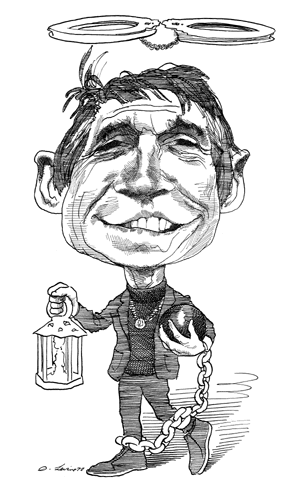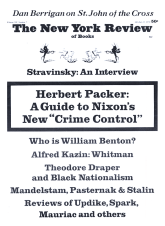Late April, 1970
…It is as though a man were to awaken one morning with the bitter revelation on his tongue—I am going to die. I am going to jail. Like a man with terminal illness whose cunning apothecary has come on a new potion, I am spared a few days. The days are here. But I live under proviso. That is my freedom and my urgency.
Meantime, I would like to do something unfashionable, in the sense not of mystification, but facing the fact that everything or nearly everything of worth today is bound to be despised or devalued.
Except to a few, to whom these words, in all seriousness and affection, are dedicated.
I should like to use, as a general guide, master text, source of imagery, the book of John of the Cross, The Dark Night of the Soul.
The choice is deliberate. It implies, in the first place, that my present situation is primarily an experience in and of the spirit, that its only coherence and meaning are to be sought on those terms. Otherwise, one is playing cat and mouse with the hunters; and the chase becomes frivolous, thoughtless, or pathetic, played out according to their feints and starts, exercised in their fears. In the second place, I claim for myself the dignity of a Christian and a man, present to his tradition (as chief strength), often faithless to that tradition (as large weakness). But in any case, within it: for good, for ill, but unrecognizable to myself apart from it. To be drawn on here and now, quickly, because the times are rude and descend like a guillotine.
This saint John; why him?
He was a resister and prisoner, and suffered grievously; as it happened in the circumstances of his world, at the hands of the church. No matter; let us say from irrational and inhuman power, in those times (as in our own, in less spectacular ways) wielded by church as well as state. He was neglected, cast down from the places his talents would justly claim. Yet in the dark socket of existence into which he had been flung to be ground to powder, a most stunning event occurred. It was a though, out of season, on the desolate streets near this house, winter-ridden and sullen, a wand of forsythia had burst into bloom, only one. In a dungeon, the light broke upon him. John was granted something due no mortal man: access to the mystery of love, sight of the bare bones and plan of the universe, odor of the heart of Dante’s rose.
He wrote an ecstatic poem (poetry: the primary inevitable response to tyranny). Later, in a rare calm interval of his life, he used the poem as source of a prose commentary, which would enlarge and make available, as far as words could, the generous grace and access which had been granted him. Both commentary and poem are among the supreme achievements of the spirit of Western man; they open to the reader, the student, the activist, immediate and rich access to the classics of Hindu and Zen. The poem, the commentary: they are all poetry, they improvise, with infinite subtlety and unfailing symmetry, on a few simple unkillable themes of the spirit. How is one to grow, in love, in the risks of love? What is the price of love? Who is this loving, invading, tireless, mysterious God, whose urgent heart is the very heart of the universe? Who calls out to man, who is silent, silent before omnipresent, omnivorous evil?
Let us move closer to the matter at hand. John is useful to us for such reasons; he suffered greatly, as a condition of life and a condition of faith. John was seeking a simple human good (we would say today). He wanted a community in which men would choose for themselves, within the freedom granted them by the truth of a tradition. He was willing to negotiate with opponents; he traveled unwearyingly in service to rational solutions. But when power breathed close and threatened hard, his adversaries came up against something harder than Spanish bone. They struck flint; and flint, in the nature of things, awakened fire. John burned with a fire which human conflict could only ignite, but which was sustained elsewhere.
Elsewhere? The movement today, in its best parts, in its finest idealism, in those occasions when it is politically most attuned, has always breathed a sense of the transcendent which puts to shame the flat-footed sterile rhetoric and method of those in power. The Port Huron statement is a case in point; it is bathed in primitive and tender light; it bespeaks the best in the American grain, as though selective memory and choice (love is always selective in instinct and method) had been able to ignore, to surmount, to treat as of no account, the pervasive horror and violence of American history. Hayden, Oglesby, and the others, what a gift they gave us! Was it the innocence that precedes experience, a simple ignorance; or was it an inclusive transcendence? We must hear from these friends again, as indeed we shall….
Advertisement
John was known as “Doctor de la Nada“: guru of the absurd. It was a title both just and exact, conferred after the fact on a man whose life stood at the heart of darkness.
Are we then merely to seize on the phrase, and by implication on his life, as another loose-jointed excuse for personal adventuring, rootlessness, irresponsibility toward those near and far? No. John opened before us another way, a precious and neglected truth: the inescapable paradoxes, the burning dialectic of truth, the high wire act required of the mind that would be—not in possession of, but possessed by the truth, in passage and in danger. An intense passivity, the shaping of man into a hand-fired receptacle before the light and rain of heaven. If he was Promethean, a world shaper in the justest sense of that word, he not only stole fire. He fulfilled that other, less scrutinized episode of the myth: he was chained to rocks, his vitals were eaten by predators (reality is predatory, it not merely presses upon man with the urgency of its evidence; it eats one alive).
The need of activists, of the best of youth today, is a spiritual need, often expressed to me, often neglected of fulfillment. It is the presence of the masters of the spirit, to help them discern what is really happening to their lives, to the forces erupting in their souls. What we used to call the presence of spiritual fathers, to aid in the discernment of spirits. So that the merely outward, the shrinking vocabulary, the wounds suffered day after day in the struggle to remain human and to vindicate life, the canker and spur and itch toward violence in answer to entrenched, vapid, self-confident violence—so that these can be confronted on other terms than those of spasmodic despair, hit and run, explosion and self-destruction. (Do some activists, in such times as these, see themselves as little more than self-destroying machines; and so wire their bodies and walk about, pure instruments of terror, like the Anarchist in Conrad or the prerevolutionary bands of students in Russia?)
But Doctor de la Nada. I should like to tell you why that title appears to me to be both delicious and apt. It is from one point of view a way of admitting to ourselves the presence of those dark forces, only partially under our (or anyone’s) control, but whose existence, faced in truth, amounts to a kind of exorcism. Since to be hidden and unadmitted to high noon and its scrutiny is their method and source of power.
Doctor de la Nada. One is guru of the absurd, or disciple of the guru; under the hypothesis that God is Lord of the Absurd. Touché. The saint has come upon God (and we come upon the saint) not as solution, goal of effort, lover of neatness, scorekeeper of fair games, suburban owner; or any of those “final solutions” which ring down the curtain on reality. No, the saint is going to let the truth out, which is to say let the beasts out, those human beasts with the masks of their choices glued to their faces. And see what happens. And see what one chooses. And go from there.
Do you sense the way of freedom this implies? Note for a moment the contrary method in public vogue. It is curiously, even boringly consistent in vocabulary and form. In virtue of an inherited gentleman’s agreement, the power gets passed on, the admissions to the club are laid down. From the UN to the White House to the courts and congress and cabinet, the same straight-faced Puritan virtue and sternness (only rarely a Reagan; if it must be, let’s have the blood bath now); men who ought to be precious to all of us, for letting the truth out of the dark bag, at least now and then. But by and large, straight cut, straight jib. The deeper and bloodier the mess, the straighter, squarer, firmer the stance.
Doctor de la Nada. Even the church had to swallow it, absurdity at the heart of holiness, at the heart of inspiration and intuition. At the heart of God also? It must be said. Yes. John was setting up a balancing act, upping the ante, opening the door (it was open anyway) on the beasts, all of them: the arts, the atom, space, atheism, technology, grace and damnation, creation, annihilation. How to say it? He was generating a storm, predicting it, welcoming it, the very condition of our lives.
Advertisement
Could this work (the liberating of Nada to wrestle with the All) be a work of God? Yes, it was.
This Issue
October 22, 1970




